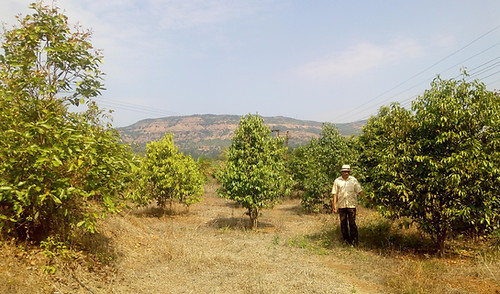Conserving Private Forests in Koyna-Chandoli Corridor: Establishing a Model For Sustainability
BACKGROUND
The Western Ghats, also known as the Sahyadri, is one of the biodiversity hotspots of the world and harbours several rare and endangered species of plants and animals. Mālki forests (forests on private land) are extensively found in the Western Ghats. Private forests are very important for several ecosystem services such as soil conservation, regulation of water flow in rivers, prevention of global warming, conservation of biodiversity and landscape connectivity. They also provide forest produce and income to the owners. (Read the news on mālki forests).
Koyna Sanctuary and Chandoli National Park together constitute the Sahyadri Tiger Reserve. The Koyna Chandoli corridor lies between Koyna Sanctuary and Chandoli National Park. It is a critical wildlife corridor and also forms part of the buffer zone of Sahyadri Tiger Reserve. It sustains extensive private forests along with government forests. The area has distinct climatic and geographic conditions which give rise to rich biodiversity. Considering its importance as a critical wildlife corridor and the large extent of private forests in this region WRCS is implementing a project for conservation of private forests.
Some benefits of conserving private forests are:
-
Economic benefits to the local community
-
Valuable ecosystem services such as soil conservation, regulation of watershed runoff
-
Conservation of biodiversity
-
Strengthening the connectivity of the wildlife corridor
The project area consists of 18 villages with a total area of 9300 hectares, of which 5200 hectares (55%) is under private forests. The people in the project area belong to the economically underprivileged section of society. Their main occupation is subsistence agriculture.
At present, the private forests are managed unsustainably because of which they are getting degraded. There is tremendous potential for conserving the forests and generating economic returns to their owners if the forests are managed sustainably by applying principles of scientific forestry.
Through this project, WRCS is promoting sustainable forest management practices that will yield enhanced forest produce and also conserve the forests. The community is encouraged to protect their mālki forests from tree cutting and fire. Tree plantation is carried out since 2014 using native tree species in blank spaces and gaps in the forest. The bamboo plantation is being carried out to yield quick income. At a later stage, they will be trained in scientific forestry practices. Income-generating activities such as beekeeping and cottage industries are being promoted.
Beekeeping is being promoted as an activity compatible with private forestry. Several training sessions have been conducted through the project. We are exploring opportunities for other income-generating activities.
Conservation of Mālki forest in this region will consolidate the corridor between Koyna Sanctuary and Chandoli National Park. It will serve as an excellent model for conservation of Mālki forests in the Western Ghats.

PROJECT AREA
Wildlife Research and Conservation Society (WRCS) has been carrying out a project for the conservation of private forests in 18 villages in corridor region between Koyna Sanctuary and Chandoli National Park. The project area is an important wildlife corridor between the two protected areas. The extent of the project area is about 9300 ha of which nearly 5200 ha is private forests. The project area is a part of the northern Western Ghats, which is one of the biodiversity hotspots of the world, and UNESCO recognized as a world heritage site. The area located in the Patan block of Satara district of Maharashtra (India).
PROJECT GOAL
The goal of the project is “to strengthen the Koyna-Chandoli corridor by the restoration of private forests, and establish a model for sustainable management and utilization of private forests”.
PROJECT ACTIVITIES
-
Eco-restoration: Tree plantation and seed sowing
-
Awareness generation
-
Environmental education for students
-
Working with 300 private forests owners from 27 villages of the project area
-
2,50,000 seedlings planted on 300 hectare of degraded private forests, achieving over 80% survival rate
-
More than 90,000 man-days employment generated in tree plantation activity for the local community
-
Corporate volunteers: From 2014, about 1100 corporate volunteers participated in the project
PROJECT ACHIEVEMENTS
EVENTS
We have carried out several events under this project. Click on the links below to see some of the main events:
-
Volunteers from KPIT helping us in plantation work (the Year 2014-15)
-
A training program on organic farming at Kalpavruksh farm of Shri Bhaskar Sawe in April 2015
-
Food processing training
-
Tourist Guide training
-
Organic farming training
-
Volunteers program
SUPPORT THE PROJECT
Incentive-based conservation is a widely practised strategy of offering monetary or in-kind incentives to the stakeholders to encourage them to adopt sustainable management practices. The incentives are generally low, but sufficient to motivate the stakeholders to adopt sustainable management practices. Conservation of existing forests by paying incentives is more cost-effective than carrying out plantation on degraded land. Agreements will be made with the Malki owners to protect forests on their land for a period of at least 5 years. Incentives will be paid after appropriate verification. We expect that the Malki landowners will become self-reliant after a period of 5 years and manage their forests sustainably without need for incentives.
Your monetary contributions will help us carry out incentive-based conservation of mālki forests at Koyna. We need your sustained commitment for a period of at least 5 years. Your donations will be used to pay incentives (cash or kind) to malki owners for protection of mālki forests. You can contribute to tree plantation through the Donate a Tree Scheme. Please visit the donate page to make donations. Please contact us to discuss specific activities to support

5 years old Plantation site at Devghar

Bamboo Plant




































